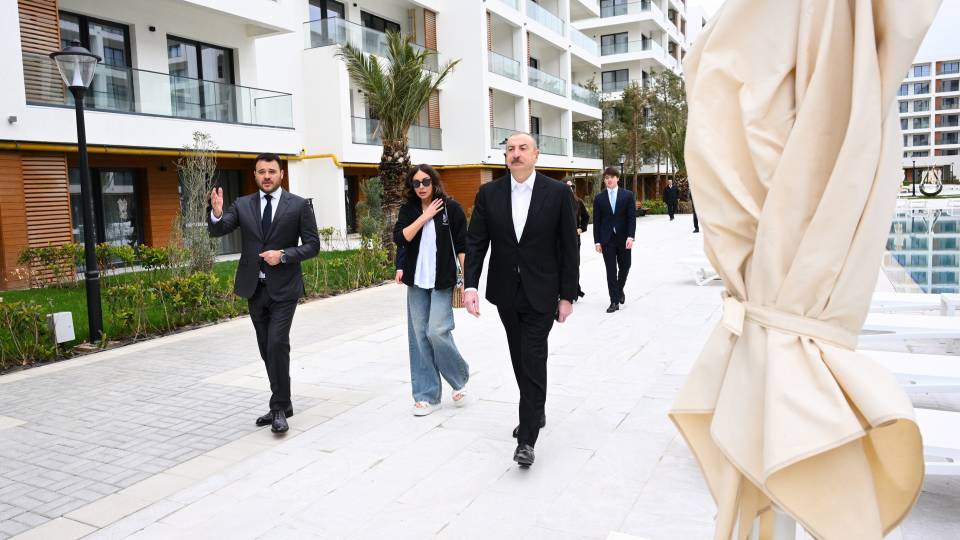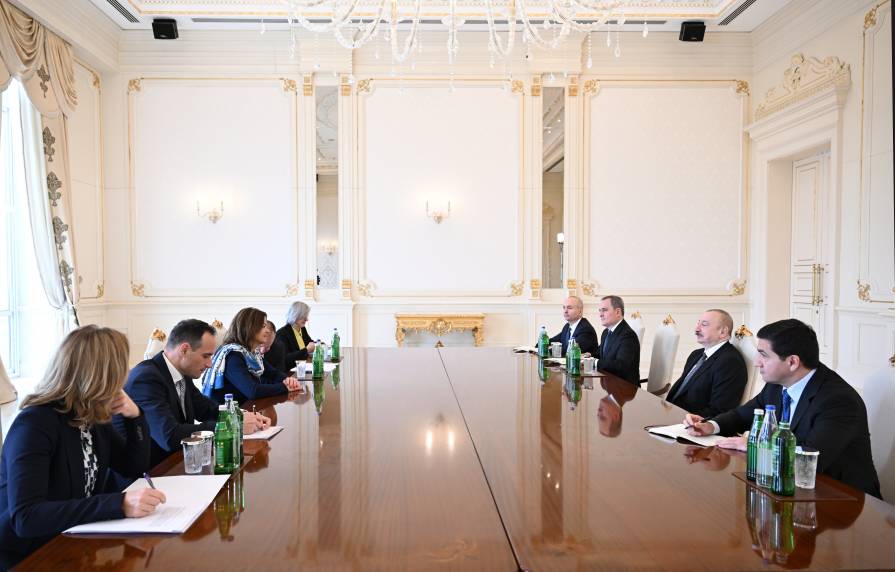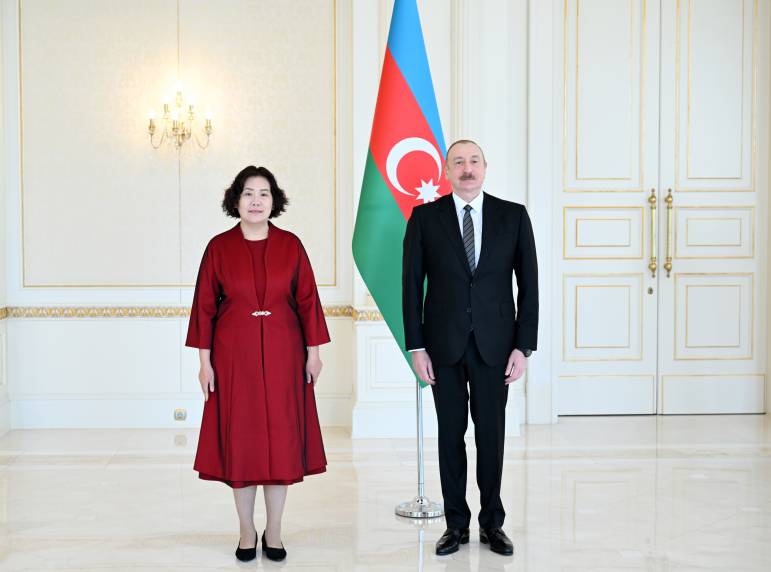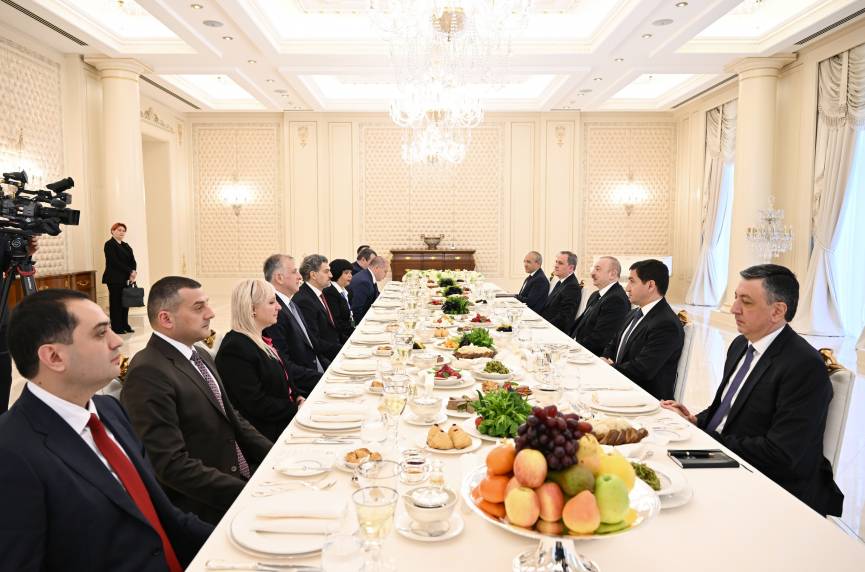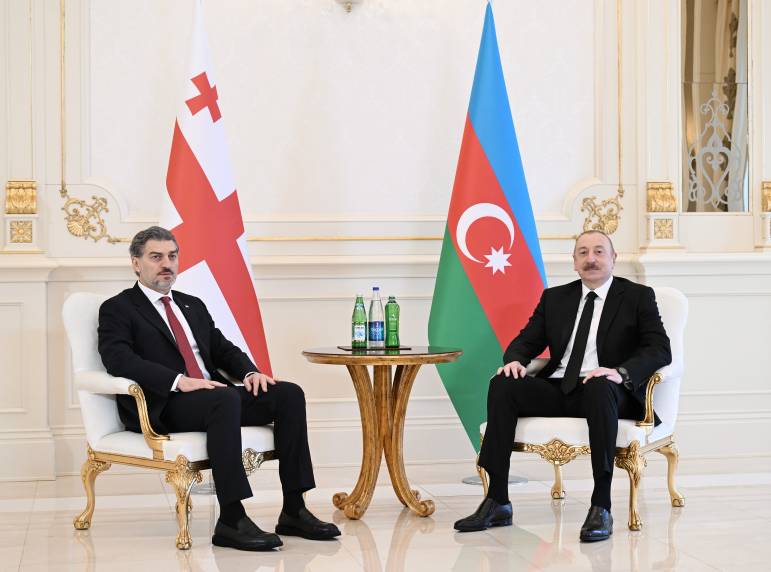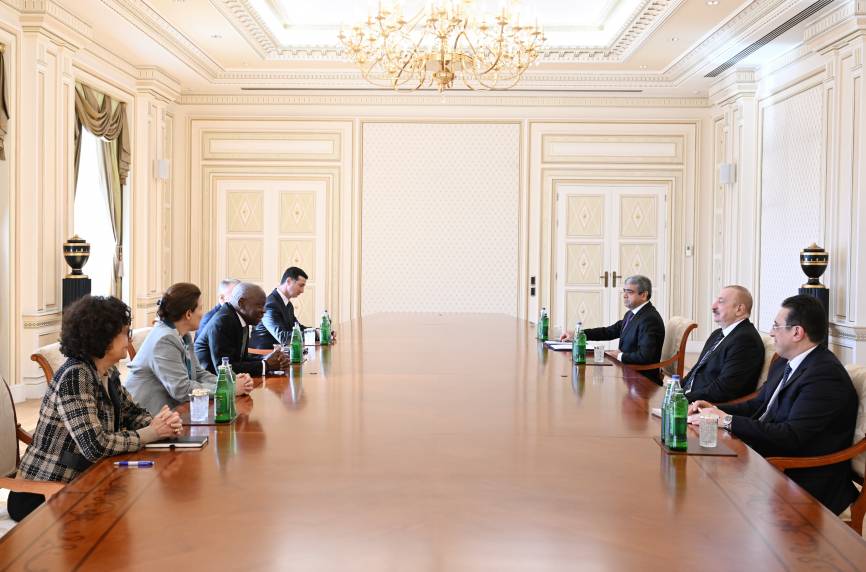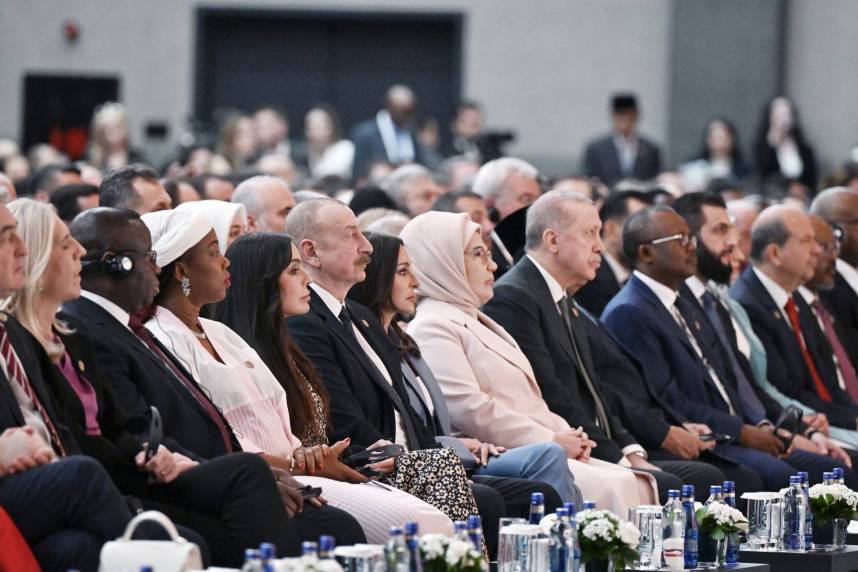Statement by President Ilham Aliyev
- Dear Mr. President.
Dear guests, ladies and gentlemen.
Mr. President, once again, welcome to Azerbaijan. I'm very glad to see you again. The President of Iraq visited us earlier this year, during the Summit of the Non-Aligned Movement. During our meeting, I invited Mr. President to pay an official visit to Azerbaijan. I'm very grateful that my invitation was accepted and the President is our guest.
I'm sure that the visit will contribute to the strengthening of friendly relations between our countries and will open a new page in our cooperation. By the way, this is the first official visit of the President of Iraq to Azerbaijan throughout the history of our diplomatic relations. So, this visit is historical.
We have covered many issues of our bilateral agenda and identified the main directions for our future cooperation during the tete-a-tete meeting and during the meeting with delegations. We will definitely continue to support each other in international institutions. Iraq and Azerbaijan always demonstrate solidarity in different international institutions. In the United Nations, Non-Aligned Movement, Organization of Islamic Cooperation, we always support each other and defend sovereignty and territorial integrity of each other.
Mr. President will visit also neighboring Armenia. Therefore, I use this opportunity to inform my guest with respect to the current situation between the two countries. Of course, to have a proper analysis of what is happening now, we all need to go back to our past, what happened in the beginning of 1990s.
In the beginning of 1990s, Armenia launched aggression against Azerbaijan, which ended in the occupation of almost 20% of internationally recognized territory of Azerbaijan, conducted a policy of ethnic cleansing, which resulted in physical expulsion of more than 1 million Azerbaijanis from the territory of the former Nagorno-Karabakh Autonomous Oblast and the surrounding districts.
So that, as I said, made almost 20% of our territory, and for many years, they refused to return the territory which did not belong to them. Despite different international mediation efforts, which actually let to zero result, Armenia wanted to keep our lands under occupation forever. So, after 28 years – since the OSCE Minsk group was established, which mandate was to find a solution to end the occupation – Azerbaijan liberated its internationally recognized territories itself on the battlefield, using military force and the legal opportunity, which was granted to us by Article 51 of UN Charter, the right for self-defense.
We hoped that after this Armenia would comply with its obligations and withdraw the remaining part of the military contingent from Azerbaijani territory, but it didn't happen. We've been very patient for almost three years. We tried, through our direct contacts with Armenia, through international interlocutors, to deliver a message that this is unacceptable. We cannot afford to have illegal separatist regime even in a small part of Azerbaijan. As I said, the large part of the occupied territories was liberated in 2020. Unfortunately, the Armenian government did not listen to us. It listened to its advisors in the West, and those advisors did not give them a good advice. Unfortunately, their advice was to keep the military contingent in our territory as long as they can.
Our patience came to an end this September, and we conducted an anti-terror operation fully in line with international law in our sovereign territory, which lasted less than 24 hours and with zero casualties among civilians. I think what we see in the Middle East now should be considered as an example of how a military operation must be conducted with zero casualties among civilians.
As a result of that, the illegal regime in Nagorno-Karabakh collapsed. Though it was illegal, but anyways, they themselves dissolved this illegal, so-called entity, which they used to call “nagorno-karabakh republic”. We restored our sovereignty, and now, the Azerbaijani flag is everywhere in our territory.
This is a history of situation. So now, we come to what is the next. And the next is that we expect – I will inform Mr. President – from Armenia the response to our comments to the proposal. Several times, we exchanged proposals on a draft peace treaty. But now we have waited for more than two months since 11 September, for the Armenian government to respond to us about their opinion on those comments, and we didn't get any answer.
I think, the reason for that is because they get bad advices, particularly, from France. France is playing a very destructive role in the South Caucasus. Actually, Armenia became a puppet of the French government now, and this can be a serious threat to the regional stability. We don't need any war. We fought on our own territory, and restored justice and international law. But the Armenian government and political establishment thinks about revenge. And the wrong messages from the French government actually create illusions in the Armenian government, and maybe in the public opinion that they can again launch a military aggression against Azerbaijan. Weaponizing Armenia, which France is proud of and publicly states, will not help Armenia, if they decide to launch another war. The result will be the same. And no one will help them. Did France help them three years ago? No. Did they help them two months ago? No. What they can do here? Nothing.
So, Armenia should plan their future based on their national interest, not on the ambitions of the countries, which are situated far away from our region, especially countries with the bloody colonial past. Their colonial policy was primarily aimed at the Muslim population in different parts of the world.
So, I think that the sooner we get a response from Armenia with respect to our comments, the better it will be. No international pressure can influence the will of the Azerbaijani people and Azerbaijani government. Armenia now is using its diaspora institutions in different parts of the world in order to attack Azerbaijan everywhere, but the result will be zero for them. We are ready for peace, but for the just peace – the peace based on recognition of territorial integrity and sovereignty of both countries, peace based on common sense and historical justice. So, I informed my colleague about that so that it will be, I think, better to understand the real situation in the South Caucasus.
Coming back to our bilateral ties, I would like to say that we broadly covered the issue of economic cooperation. In two-week time, our delegation will visit Baghdad to hold a new round of the meeting of the intergovernmental commission. We have big plans how to enhance the level of mutual trade. We also discussed today the issues related to cooperation in the energy area. During the visit of our delegation next month, this issue will also be covered.
We discussed the opportunities of cooperation in the areas of defense industry and tourism. We were already informed today at the meeting with the delegations that the first direct flight between our capitals already started, and in the coming weeks probably we will have direct flights to Kirkuk, to Erbil, and to Basra. So, we're expecting a large volume of tourism traveling in both directions and, of course, we discussed what additional steps will be taken in order to have a visa facilitation. So, I am sure that the visit will have very good results. We once again reconfirm the friendly relationship between our countries. Continuation of our dialogue, I'm sure, will lead to new good results and our cooperation will strengthen. So, once again, Mr. President, welcome. Thank you for being with us today.
x x x
Statement by President Abdullatif Jamal Rashid
- Mr. President, dear colleagues, ladies and gentlemen.
I am very glad to be here. This is my second visit to Azerbaijan with the kind invitation of Mr. President. I thank you for inviting us here.
I think our visit has been very fruitful and very useful. Our cooperation is on the way to be much more stronger than the past. We can cooperate in many fields of activities as regard to construction of infrastructures, normal trades, oil and gas, multinational projects and at the same time, investment in Iraq, and at the same time, encouraging tourism, education and in the fields, which are very important to the two nations.
Mr. President, allow me to give you a brief picture of new Iraq, which I call a new Iraq. I am sure, Your Excellency knows about our history, in which we suffered a long period of time and dictatorship, various and popular governments, military governments, at the same time, one-party governments or one-person governments. And that went on for quite some time, which caused us internal conflicts, sometimes wars between Iraqi communities, and war between communities and the government, war between Iraq and our neighboring countries and even challenging international community. The Iraqi behavior was rejected by international community and by our neighbors, which led us to invasion of Iraq. And at the same time, we suffered after the invasion by the terror attacks. The last action of terrorism was ISIS attacking Iraqi population and Iraqi cities and Iraqi centers.
But I'm glad to report and inform you that has passed away. Iraq is in a good healthy condition. We have peace, security and at the same time, a government, which has been elected by the people. We have a large number of parliamentary activities and parliament in Iraq. The total number of parliamentary members comes nearly 330. We have elected a government and we have elected a president for Iraq. During this period, although it took us a long period of time to come to this conclusion, but it was useful for the Iraqi nation as a nation, because we reached these decisions through dialogue, through understanding, through cooperation between various nationalities in Iraq, various religions in Iraq and various political parties in Iraq. They all contributed to achieving this end.
Now, as I said, the government has been formed a year ago, and the President has been elected before choosing the government. We have a parliament, which has been in session for a year looking into affairs of Iraq. And the government is trying to implement what is needed.
We have divided our responsibilities to two major actions or activities. One to improve our infrastructures, the second is to review all our services. During the period of conflicts, wars, I think, all the infrastructures in Iraq were damaged, and all the services fell behind. So, we are trying to improve and fix what is needed for Iraq.
The Iraqi economy is good. We have oil production, which is about 4 or 4.5 million barrels a day. We have agriculture, we have water resources. I think Iraqi economy is good now and it will be better even in the future. We have started multinational projects regarding energy, oil, agriculture and other fields.
So, I think, our visits here have been useful, and we hope to repeat this visits. I'm very glad that the delegation from here is coming to Iraq soon. We will again discuss all the necessary matters for cooperation and for starting cooperation in many fields as you mentioned, Mr. President.
We have to create a new environment for business in Iraq, and at the same time, business opportunities for Azerbaijan in Iraq. Mr. President, I congratulate you on achieving peace and stability in Azerbaijan. At the same time, I wish you all the luck in finalizing your agreement with Armenia. I think that war and conflicts can only lead to worsening the situation. It cannot solve any problem. I think all our problems have to be solved through dialogue, through understanding and through cooperation.
Unfortunately, the entire Middle East and even - it has affected the world – we are suffering from a new conflict in the Middle East, which is the rights of Palestinians. The Iraqi position on this issue is very clear. We fully support the rights of all Palestinians whether in West Bank, in Gaza or anywhere in the world. We hope that the Palestinians will achieve their full national rights and be recommended as a state for Palestinians soon.
Without solving this conflict, genuinely, I think the tension in the entire area will remain and the peace and stability will not be secured. So, our sympathy is with the Palestinian people and our support is for Palestinian people. Iraq’s position is very clear from the day and we have informed the international community about our position. We condemn the actions, which carried out in Gaza by killing and attacking civilians, plus the infrastructure, which is in Gaza with regard to schools, hospitals, and housing and population in Gaza. I hope this crisis will come to an end soon and Palestinian people will establish their rights in their own land.
Mr. President, I think there a number of topics, which we can talk about in detail. But I think I'll leave that to our different ministries and in different institutions in the two countries to tackle these agreements or to tackle these standing problems to solve it.
I'm very glad to see the cooperation between the two sides is getting better and we will be in touch and receive your delegations, whenever they have time and whatever it needs to be by establishing the transportation between the two countries through the flights and, at the same time, learn from some of your experience.
Finally, I want to really congratulate you for the achievement, which you have done, what I've seen only in Baku regard to infrastructures, building, and organization in the city. I congratulate you. That is a fantastic achievement for any country and all you should be proud of living in Baku.
Again, Mr. President, thank you very much for inviting us. It has been a pleasure to spend time with your colleagues. And again, wish you all the luck and wish you success in the future.

